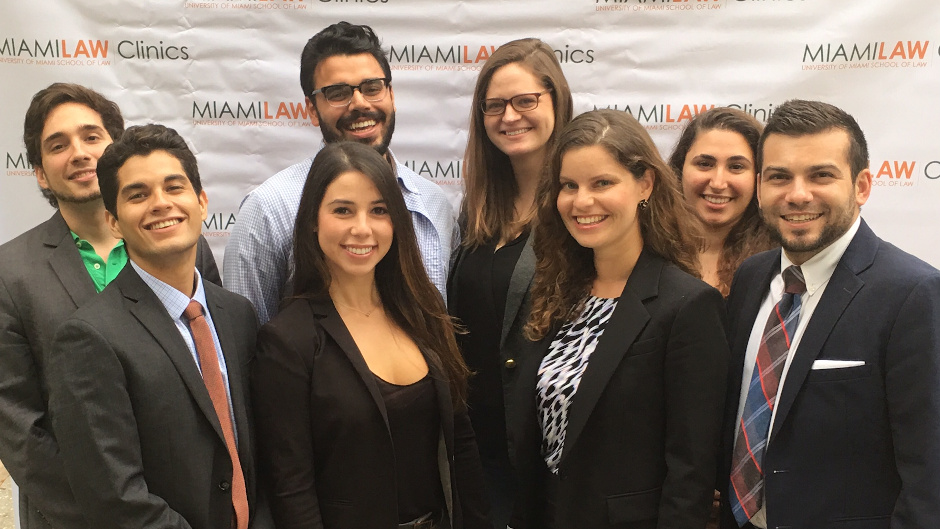Around the world, members of the lesbian, gay, bisexual, transgender, queer and intersex community face discrimination, persecution, and torture simply because of their identities or whom they love. In the last year, Miami Law’s Immigration Clinic has helped LGBTQI individuals from Jamaica, Russia, and Honduras achieve safety in the United States through Asylum and Withholding of Removal.
For years, Nicholas* and Sergei*, a couple from Russia, were forced to hide their relationship from family, friends, and their community. Nonetheless, suspicions about their sexual orientation led to their detention by police, who encouraged other detainees to beat and rape them. When the couple fled Russia for the U. S., they were finally able to marry and live their lives openly. But their safety was not truly secure until April 27, 2016, when the U. S. Citizenship and Immigration Service granted them asylum, putting them on a path to citizenship. Nicholas and Sergei were represented by former clinic students, Sabrina Niewialkowski, J.D. `16, Robert Pecchio, J.D. `16, and Ellen Kruk, a 3L.
“When Nicholas and Sergei won their asylum, I was thrilled for them. They had been through so much over the years and during the process, they had the difficult task of retelling and reliving their story," says Kruk, who served as an interpreter on the case before joining the Clinic and then represented the couple before USCIS as a Clinic student. "It was great to be a part of the solution and to see that painful and uncertain chapter in their lives come to an end.”
The Clinic also recently represented two bisexual clients from Jamaica. The island nation has long been considered one of the most homophobic countries in the Americas. In the winter of 2016, Clinic student Claire Howe, J.D. `16, met Angela*, a young bisexual woman, during a visit to an immigration detention center. After the visit, Howe and her Clinic partner, Jessica Brautigam, a 3L, approached the Clinic Director and asked if they could take Angela’s case.
“In the current deportation environment, with complex legal rules and limited access to legal resources, it seemed very unlikely Angela would find an attorney if the Clinic did not represent her. We felt compelled to help,” says Brautigam.
Though born in Jamaica, Angela had spent most of her life in the U. S. She had been particularly vulnerable to physical and sexual violence because she had no family and no one to help protect her from the harm she feared if deported to Jamaica.
“Talking with Angela in detention for the first time and hearing her story and the trials she had faced as a young woman made an enormous impact on me," says Howe, now a State Attorney. "After learning about her sexual orientation and the probability of her being persecuted back in Jamaica because of it, I knew that I had to do something.”
Although Angela was ineligible for asylum because of procedural rules, the students successfully represented her in a Withholding of Removal case before an immigration judge.
This summer, the Clinic also won Withholding for a bisexual man from Jamaica, a recent arrival in the U. S. who had suffered beatings and rape because of his sexual orientation. He was represented by third-year students Martin Rosenow, current Clinic Fellow, Kristen Barros, Ariana Barlas, and Feras Ahmed.
"Winning our client's case brought me enormous satisfaction, especially considering that he had spent about eight months in immigration detention," says Rosenow, who took the case to trial."The case heightened my awareness of the physical and mental toll prolonged detention has on innocent individuals with valid claims for relief. Our client greatly appreciated the zealous advocacy we provided him, and I am grateful for the help of my partners and the guidance of my supervisors."
Finally, summer Clinic students Daniel Celaya and Carlos Alvarez, both second-years, helped win asylum for a young Honduran lesbian and human rights activist from Honduras who suffered discrimination, physical attacks, and death threats because of her sexual orientation and work in support of the LGBTQI community in Honduras.
“The experience has not only been one of the most rewarding I've had in law school, but in my life,” says Alvarez. “As a former asylee, I am proud knowing my colleague and I were an integral part of our client's ability to achieve a safe and judgment free life here in the United States.”
"This summer I learned there are thousands of people being persecuted to death solely for being themselves," Celaya says. "Being able to apply the concepts I learned in law school to successfully change the course of someone's life serves as a lesson that it is never too early in our legal career to make a difference."
“We are incredibly proud of the dedication our students have shown towards their clients,” says Romy Lerner, Associate Director of the Clinic. “Through the process, they have learned invaluable lessons they will take into their future careers.”
The Immigration Clinic is part of Miami Law’s Clinical Program in which second- and third-year students represent clients and work on advocacy projects under the supervision of faculty members.

